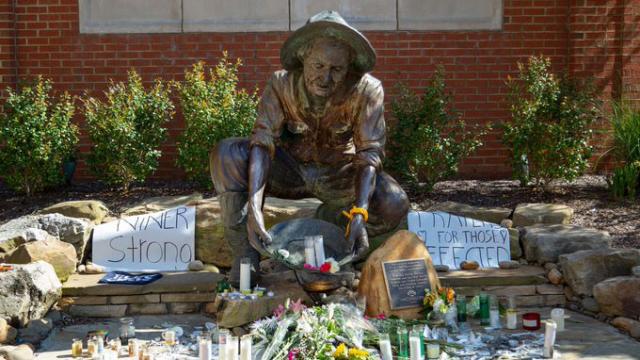In the immediate aftermath of the campus shooting on April 30, staff from Atkins’ Special Collections & University Archives began collecting the various remembrances left on the steps of the Kennedy Building and at the foot of the Miner statue. As the University Archivist for UNC Charlotte, Katie Howell’s role is to collect, preserve, and make available records related to UNC Charlotte. That can mean the official records that Atkins is required to keep as a public institution, but it also means the personal stories and memories of our staff, faculty, students, and alumni. Howell serves on the Niner Nation Remembrance Commission which is charged with thoughtfully and compassionately leading a comprehensive process to determine how to best memorialize the victims and remember the tragedy that occurred on April 30, a day that will forever be part of UNC Charlotte’s history.
Howell was interviewed by Denelle Eads, Atkins’ Employee Relations & Staff Development Librarian, weeks after the tragic event.
DE: Why did you feel a need to go to the Kennedy building to retrieve the items that were left as memorials for the victims?
KH: Dawn Schmitz (Associate Dean for Special Collections & University Archives) and I were contacted by the Chancellor to make sure that we had a plan for preserving the items left at the memorials on campus. Rainy weather was in the forecast days immediately following the tragedy, and we wanted to make sure that items weren’t completely destroyed from the rain. We wanted to keep items in place as they were left for as long as we could since that is how people intended them to be seen and shared. However, we would have assisted in the preservation of these items regardless, since it is the role of the University Archives to preserve our memories and document historical events. Fortunately, we had the support of the Chancellor and Facilities Management to engage in this preservation work.
DE: How important is it to capture and preserve these items?
KH: I think it’s incredibly important to preserve these items. Once archived, these materials will help tell the stories of those affected by this tragedy and will make those stories available to a wider audience in years to come. We hope the collection will provide historical context for understanding this event and document both the official and unofficial responses to it. Most importantly, the memory of our students who were injured or lost forever will be preserved in the history of UNC Charlotte through the University Archives.
DE: How difficult is it to handle the items left by mourners of the victims? Is it an emotional task for you? What strategies are you taking to get through this?
KH: Yes, this is highly emotional work, and will continue to be as time goes on. It has helped me to focus on the practical side of the work (planning, organizing, and researching), and know that what we are doing in the archives is an important part of the grieving and healing process for our community. I make sure to touch base with Atkins colleagues and ask for support and advice as I need it. I also try to step back and focus on other work periodically.
DE: Can you estimate how many items you have collected over the past few weeks?
KH: We don’t count individual items in archives, but the collection so far is three boxes, as well as some oversized items. We also have a growing collection of digital materials. Official records and condolence items will continue to be added to this collection over time, as well.
DE: What kinds of things are you preserving?
KW: So far I have been dealing with several different groups of items. The first are items that were placed at the two temporary memorials set up on campus at the Kennedy Building and the 49er miner statue. These include things like poster boards with messages of support, smaller handwritten notes, art pieces, school memorabilia, and so on. The second group of items that have been coming to the archives are messages of support that were sent to various administrative offices on campus, like the Chancellor, Provost and Vice Chancellor of Student Affairs. These include things like banners, government resolutions of support, and handwritten notes and cards from peer institutions. We are also keeping a third group of records, and those are born-digital records related to April 30. This group of records includes social media posts, news articles and videos, podcasts, digital photographs, and text messages collected by Special Collections staff and sent to us by members of the community. We continue to collect these items through the Niner Nation Remembers site.
DE: What have you learned about the university community from this tragic event?
KH: I’ve learned just how strong our community is, and how much people genuinely do care for one another here. I’ve seen wonderful outpourings of compassion and support, and that has been really inspiring.
DE: Have you been in contact with other colleges, universities, or agencies who have experienced a similar situation? What support, if any, have you received?
KH: I have heard from several North Carolina archivists who have offered support as we may need it. I’ve also been in contact with Tamara Kennelly, who is the University Archivist at Virginia Tech. She’s offered wonderful words of emotional support, as well as practical advice for doing this kind of archival work.
DE: What is the most interesting thing you can share about this experience?
KH: It has been really great to see the full support of the University come to assist the University Archives in this work. I’ve been able to collaborate with the Chancellor’s Office, Facilities, Campus ITS, and University Communications. It’s been encouraging to see people from across campus come together to offer support for this important work.
